U of T Law students delivered excellent performances
This year, the experiences of mooting participants at U of T Law varied. While some moots were able to take place in-person, many of them were virtual because of the ongoing pandemic. Overall, U of T Law was very successful in this competition season, winning numerous awards and taking home some big wins.
Adam F. Fanaki Competition Law Moot
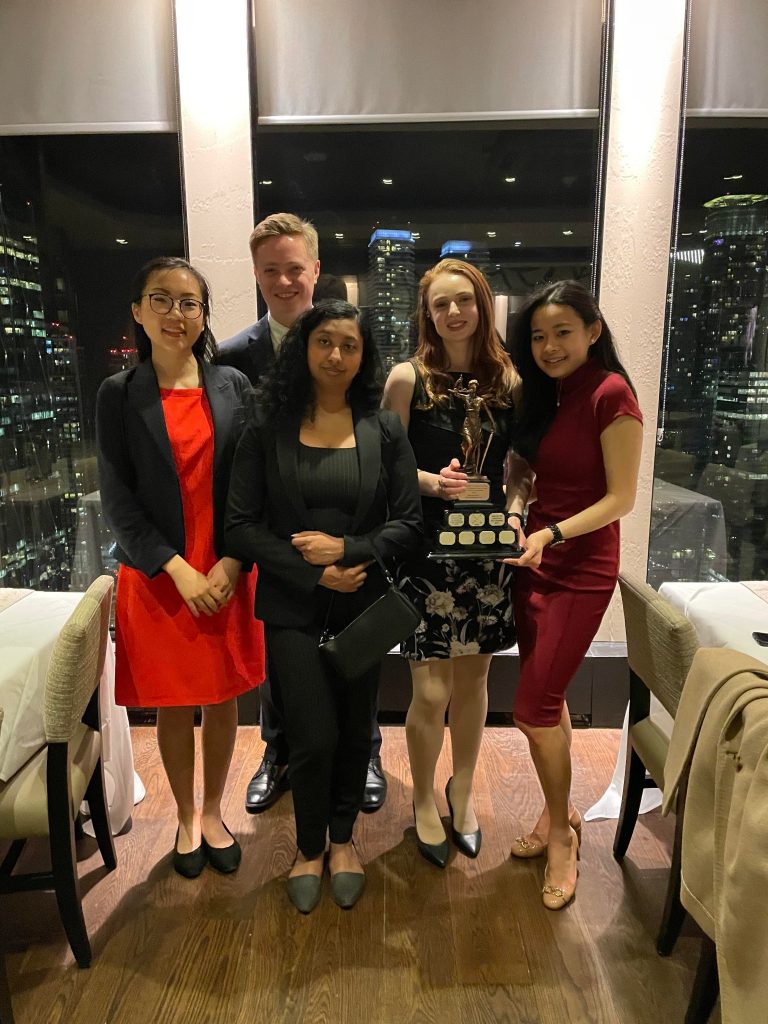
Team Members: Grace Li (2L), Monica Layarda (3L), Kyra McAlister (2L), Peter Tross (2L)
Student Coaches: Mackenzie Cumberland (3L), Sofia Sugumar (3L).
Faculty Advisor: Anthony Niblett
Practitioner Coaches: Michael Laskey (Stikeman Elliott LLP), Nathaniel Read-Ellis (Adair Goldblatt Bieber LLP)
The moot problem involved a corporation called Citrus, which produced electronic devices that exclusively used Citrus’ own operating system, “Seed.” An updated version of Seed required third-party apps to obtain user consent before engaging in certain types of data usage (categorized by Citrus as “tracking”). However, this policy did not apply to Citrus’ own apps and users continued to provide consent to such tracking by Citrus apps by default (although users could withdraw their consent). The Commissioner of Competition alleged that this policy contravened section 79 of the Competition Act.
U of T delivered a stellar performance at the moot. The team not only won the Best Team award after winning the finals, but also took home numerous prizes. Monica Layarda (3L) and Kyra McAlister (2L) won the Best Oralist for Appellant and Runner Up Best Oralist for Appellant awards respectively, as well as the Best Appellant Factum and Best Appellant Team awards. Mackenzie Cumberland (3L) and Sofia Sugumar (3L) also won the Best Coaches award. The team also received the Best Faculty Overall award for all of its accomplishments.
Cassels Brock Cup (“Baby Gale”) Moot
Team members: Julia Campbell (1L), Julia Cappellacci (1L), Emma Danaher (1L), Laura Hunter (1L), Benjamin MacLean-Max (1L), Shelby Martin (1L), Evan Morin (1L), Ryan Reid (1L), Jack Stewart (1L), Ayushi Thakur (1L), Christine Wang (1L), Nicolas Williams (1L)
Coaches: Jean-Pierre D’Angelo (3L), Laura Goldfarb (2L), Charles Ma (2L), Ben Zolf (2L).
The Cassels Brock Cup, also known as the Baby Gale, is a competition between U of T Law and Osgoode Hall Law School. It shared the same moot problem as the Gale Cup, which can be found below.
The competition took place on March 26. U of T won the moot. Julia Cappellacci (1L) and Benjamin MacLean-Max (1L) took home the 2nd place and 3rd place oralist awards, respectively. Cappellacci and Nicolas Williams (1L) received the 2nd best respondent award. Shelby Martin (1L) and Emma Danaher (1L) received 1st best appellant, while Evan Morin (1L) and Ayushi Thakur (1L) received 2nd best appellant.
Davies’ Annual Corporate/Securities Law Moot
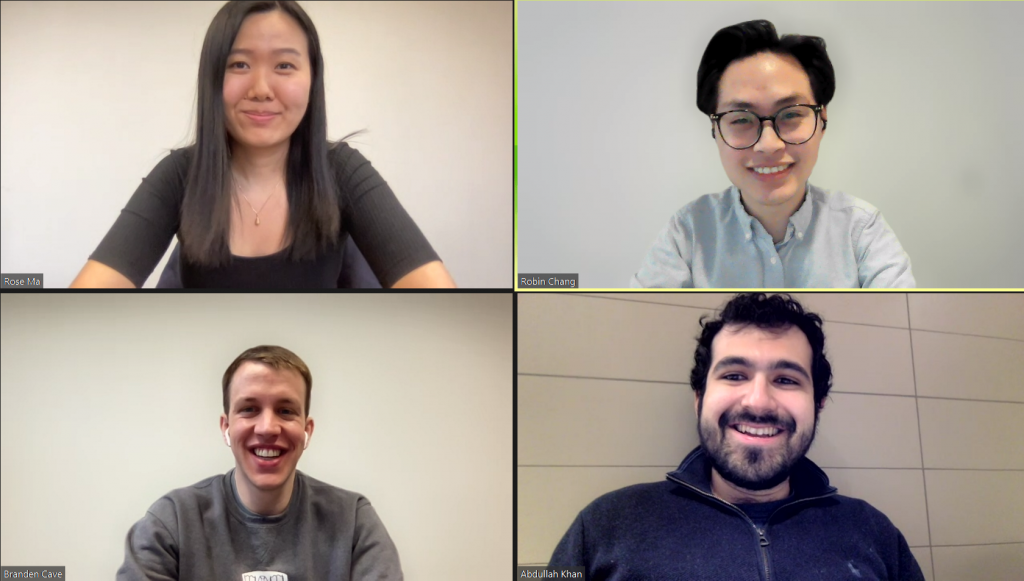
Team Members: Branden Cave (3L), Robin Chang (2L), Abdullah Khan (3L), Rose Ma (2L)
Student Coaches: Vivian Cheng (3L), Mackenzie Cumberland (3L), Flint Patterson (3L), Sofia Sugumar (3L)
Practitioner Coaches: Shane D’Souza (McCarthy Tétrault LLP), Andrew Matheson (McCarthy Tétrault)
The moot problem involved the approval of a plan of arrangement under section 192 of the Canada Business Corporations Act. The appellant was an animal hair care company on the brink of insolvency that sought to rearrange its capital structure to secure its survival. The respondent was a competitor, shareholder, and debtholder of the appellant and challenged the recapitalization plan on a number of discrete legal issues.
The moot took place on April 1 and 2. Branden Cave (3L) received the 3rd place oralist award.
Donald G.H. Bowman National Tax Moot
Team Members: Zoey Chau (2L), Dylan Juschko (3L), Zachary Wallace (3L), Chuxi Wang (2L).
Student Coaches: Hannah Bourgeois (3L), Thien Hoang (3L)
Practitioner Coaches: Andrew Boyd (Osler, Hoskin & Harcourt LLP), Martha MacDonald (Torys LLP)
The moot problem was based on an appeal of the decision from the Tax Court of Canada in Agracity Ltd v The Queen to the fictional Bowman Moot Court for Tax Appeals. It is concerned with the reassessment of a taxpayer’s income on the basis of the sham doctrine and the transfer pricing provisions in the ITA.
Frank W. Callaghan Memorial Moot
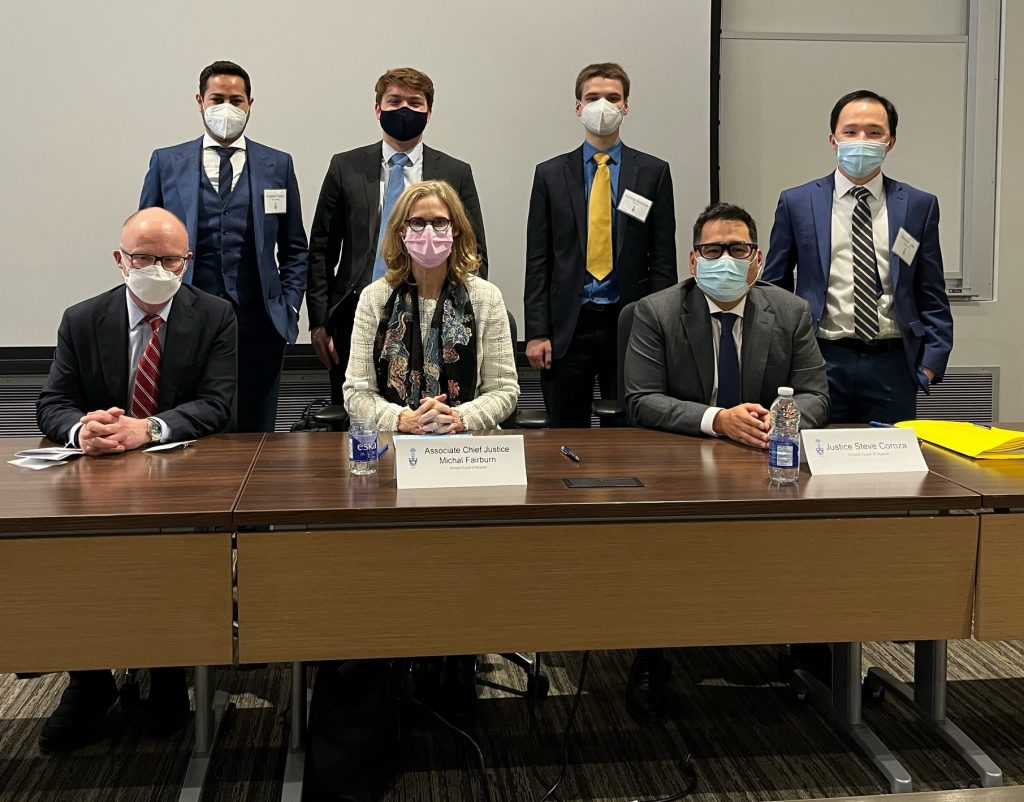
(Picture was taken at the finals of the Callaghan Moot. Top left to right: Hussein Fawzy (2L), William Hall (2L), Sterling Mancuso (3L), Gordon Lee (3L). Bottom left to right: Justice Gary T. Trotter, Justice Michal Fairburn, Justice Steve Coroza.)
Team Members: Tiasha Bhuiyan (2L), Hussein Fawzy (2L), Myles Goodman-Vincent (2L), William Hall (2L), Adam Iggers (2L), Gordon Lee (2L), Max Levy (2L), Sterling Mancuso (2L), Kaitlyn Nelson (2L), Zach Rosen (2L), Stefan Rus (2L), Alison Schwenk (2L), Anisha Sivathas (2L), Cameron Somerville (2L), Emma Tomas (2L), Bill Xu (2L)
Student Coaches: Militza Boljevic (3L), Nicholas Buhite (3L), Ema Ibrakovic (3L), Yasmin Masoudi (3L), Julia Nowicki (3L), Aya Refaat (3L), Dan Schechner (3L), Michael Shaffer (3L)
The moot problem was based on R v Tim, a case currently before the Supreme Court of Canada. It dealt with whether the police had the power to assert and search someone for possession of a substance that the police mistakenly believed to be illegal.
The mooters competed in two preliminary rounds. In the finals, Gordon Lee (2L) and Sterling Mancuso (2L) appeared on behalf of the appellants while Hussein Fawzy (2L) and William Hall (2L) represented the respondents. In the end, Fawzy and Hall took home the win. The Top Oralist awards went to Hall (1st), Max Levy (2L) (2nd), and Fawzy (3rd). Mancuso and Lee won the Top Appellant Factum award, while the Top Respondent Factum award went to Zach Rosen (2L) and Adam Iggers (2L).
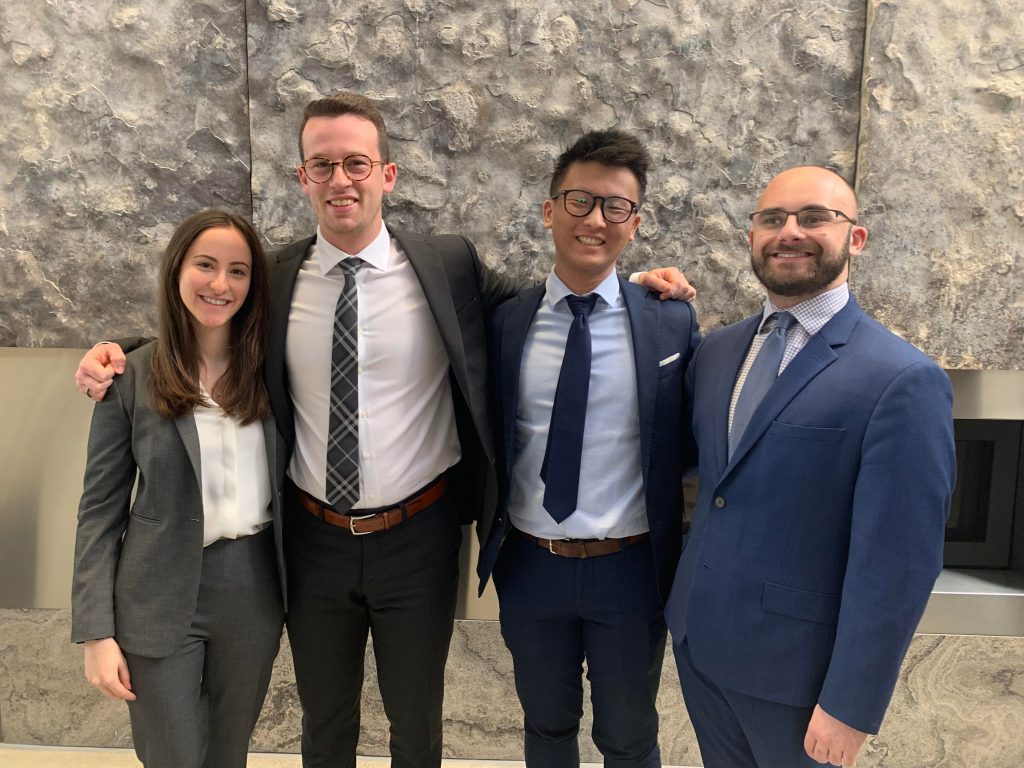
Team Members: Jean-Pierre D’Angelo (3L), Laura Goldfarb (2L), Charles Ma (2L), Benjamin Zolf (2L)
Student Coaches: Militza Boljevic (3L), Ema Ibrakovic (3L), Emily Tessier (3L), Sophie Zhao (3L)
Practitioner Coaches: Paul-Erik Veel (Lenczner Slaght LLP), Sinziana Hennig (Stikeman Elliott LLP)
The moot problem involved a Quebec naturopath who injected an elderly patient with nutrients which, unbeknownst to the naturopath, were contaminated and caused the patient’s death. Despite the naturopath’s qualifications, naturopaths in Quebec are not legally authorized to administer such injections. The naturopath was charged with unlawful act manslaughter and criminal negligence causing death.
U of T won an award for being the best English team that did not advance to the finals.
The Hamish Stewart Cup (“Baby Callaghan”)
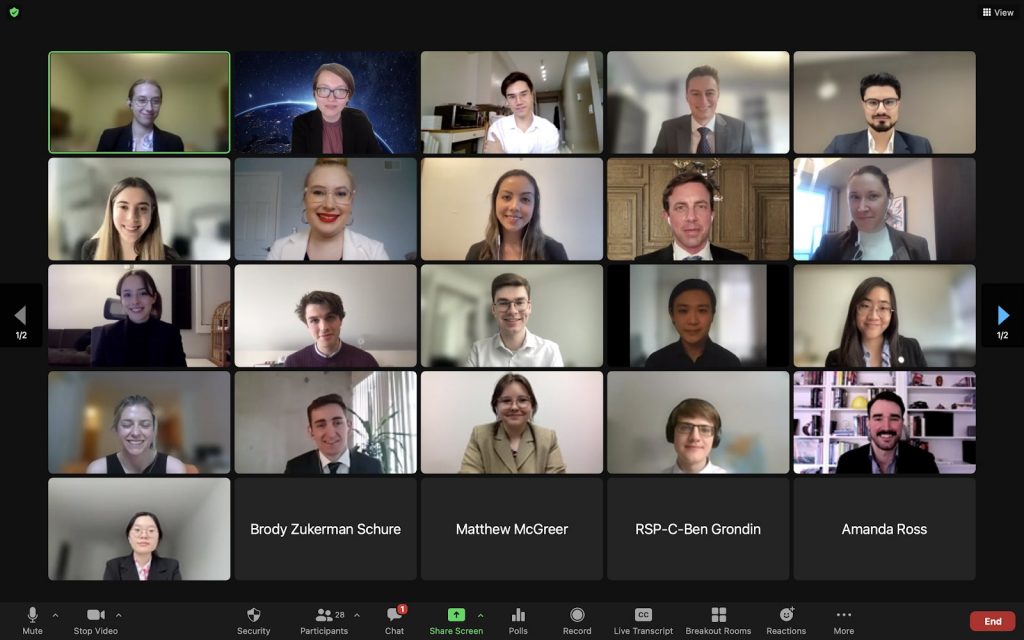
Team Members: Andrea Almeida Pasko (1L), Christopher Black (1L), Robert Chiang (1L), Caeleb “Rae” Goff (1L), Rose Ghaedi (1L), Ben Grondin (1L), Liam Forbes (1L), Gurratan Gill (1L), Emily Sarah Hean (1L), Diego Jimenez Juri (1L), Isaac Jonker (1L), Kunal Khemani (1L), Rebekah Kim (1L), Ben Kitching (1L), Vivian Li (1L), Ziqi Liu (1L), Ronan Mallovy (1L), Matthew McGreer (1L), Justin Nathens (1L), Edmund Nilson (1L), Jacqueline Ovsenek (1L), Hadi Qarizada (1L), Nikou Salamat (1L), Brody Zukerman Schure (1L), Roya Shidfar (1L), Kristen Shorer (1L), Aimee Veiner (1L), Lucy Yang (1L)
Student Coaches: Rachel Allen (3L), Maddie Andrew-Gee (3L), Militza Boljevic (3L), Myles Goodman-Vincent (2L), Ema Ibrakovic (3L), Adam Iggers (2L), Sam Kokonis (3L), Kaitlyn Nelson (2L), Ainslie Pierrynowski (3L), Zach Rosen (2L), Ryan Shah (3L), Cameron Somerville (2L), Emma Tomas (2L), Bill Xu (2L).
The Stewart Cup, also known as the “Baby Callaghan”, is an intramural moot for 1L students. It shared the same problem as the Callaghan Cup, which can be found above.
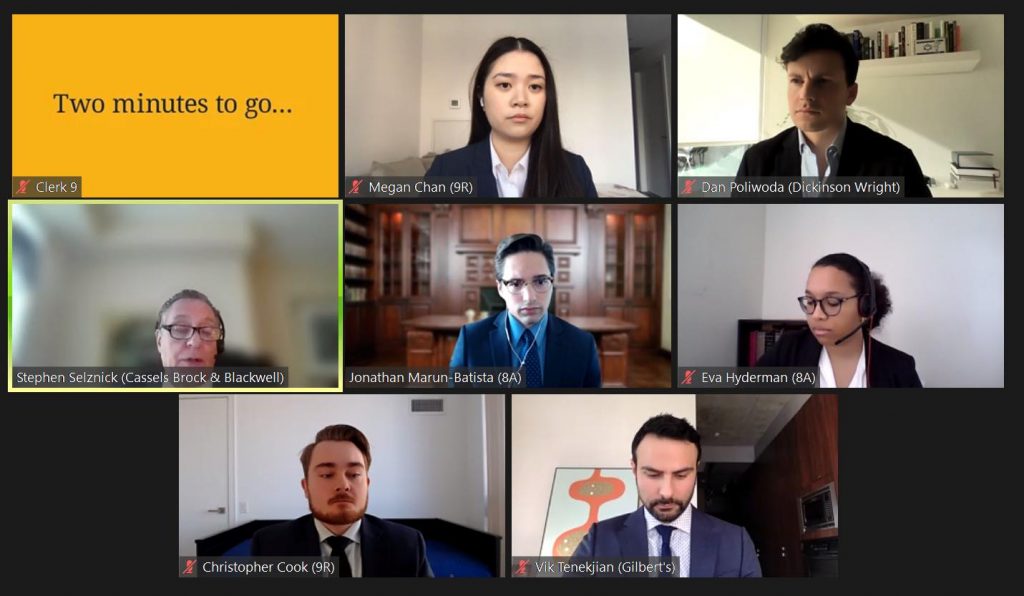
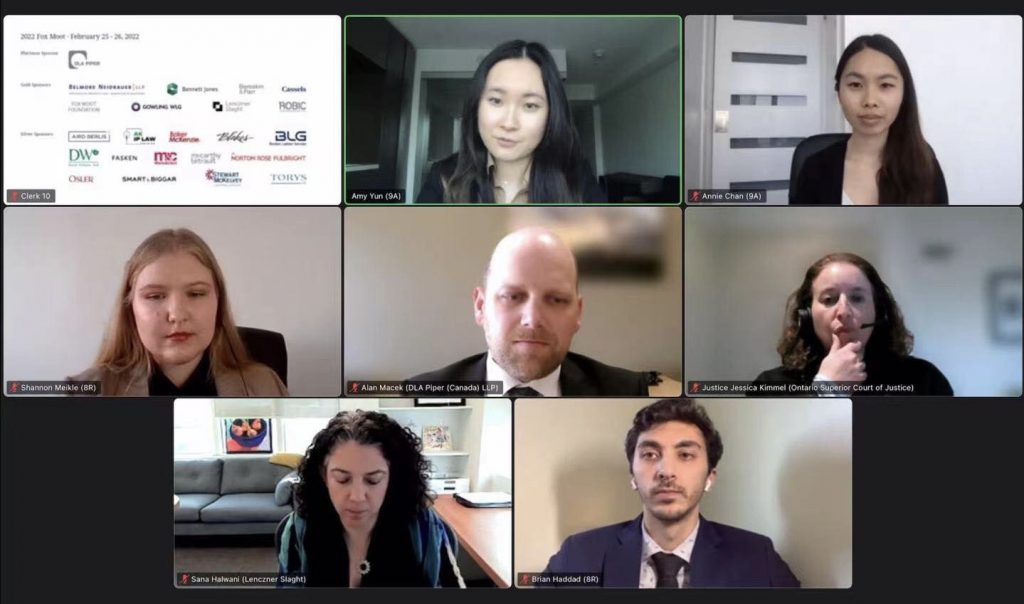
Team Members: Annie Chan (2L), Megan Chan (2L), Christopher Cook (3L), Amy Yun (2L)
Student Coaches: Samantha Kokonis (3L), Hannah Cinel (3L)
Practitioner Coaches: Andrew Shaughnessy (Torys LLP), Dominique Hussey (Bennett Jones LLP)
The moot problem was a copyright case between a social media influencer and photographer (Wanda Rer), and a large hotel chain (Bestmont) regarding photographs taken by Rer that were displayed in Bestmont’s hotels. The issues were concerned with 1) whether copyright subsisted in Ms. Rer’s photographs, 2) whether Bestmont infringed her copyright, and 3) what would be the appropriate amount of damages.
Immigration, Refugee, and Citizenship Law Moot
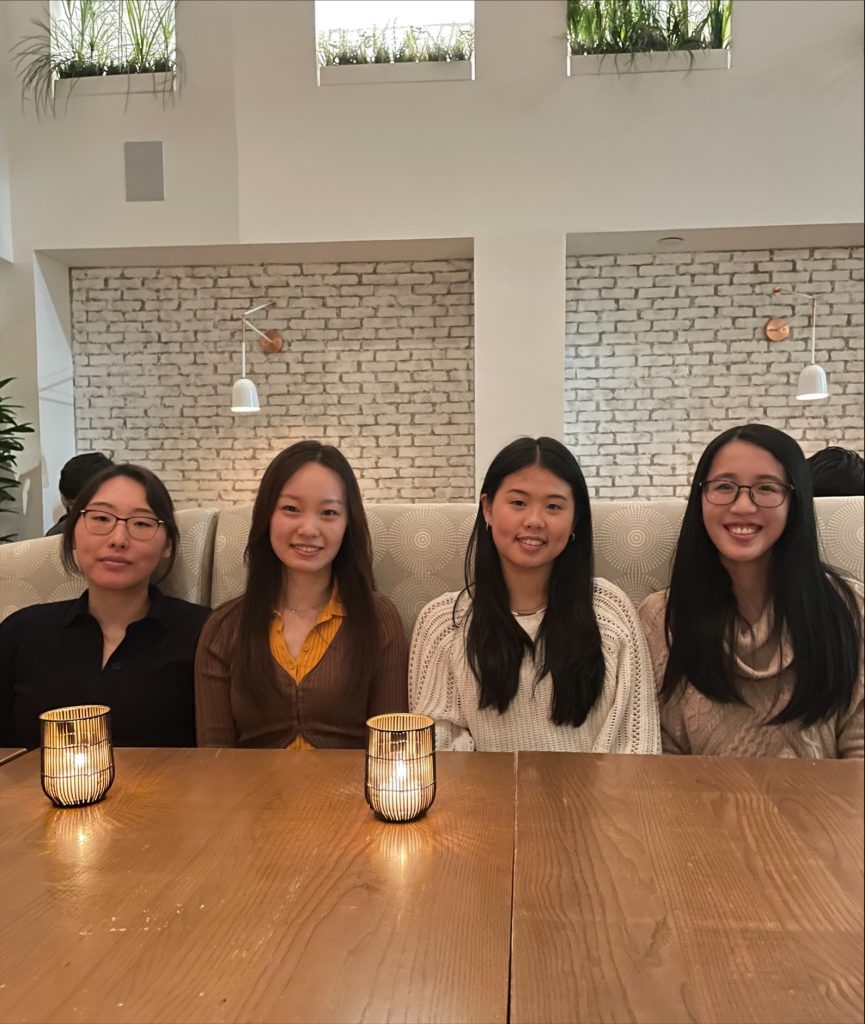
Team Members: Amy Chen (3L), Alexa Cheung (3L), Sue Yingxue Li (3L), Iris Liu (3L).
Student Coaches: Ellen An (3L), Lavalee Forbes (3L)
Practitioner Coaches: Michael Battista (Battista Smith Migration Law Group), Nicholas Woodward (Battista Smith Migration Law Group)
The moot problem dealt with whether a vacation application against the appellants, brought by the Minister of Public Safety and Emergency Preparedness pursuant to section 109 of the Immigration and Refugee Protection Act, constituted an abuse of process. The appellants were granted refugee status as dependents of their father’s refugee claim in 1999. In 2005, the Minister became aware that the father made material misrepresentations in his refugee claim, but only filed an application to vacate the appellants’ refugee status in 2017. The appellants argue that there is an abuse of process because of this delay.
U of T was recognized as the Top Law School of the competition and the team also received the award for Top Factum.
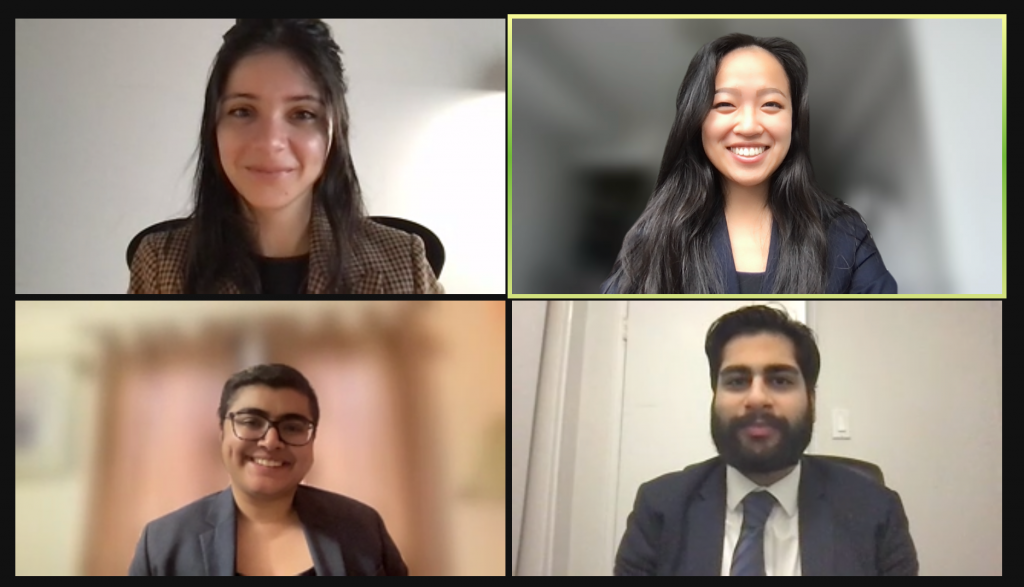
Team Members: Vanshika Dhawan (3L), Kiyan Jamal (3L), Julia Pimentel (3L), Anna Zhang (3L)
Student Coaches: Mackenzie Claggett (3L JD/MPP), Aya Refaat (3L)
Practitioner Coaches: Joseph Cheng (National Litigation Sector, Department of Justice Canada), Emily Lam (Kastner Lam LLP)
The moot problem was a judicial review on the Canadian Judicial Council’s decision to not sanction Justice David Spiro for his alleged interference in the hiring process of Dr. Valentina Azarova at the University of Toronto’s International Human Rights Program. Mooters were required to advance both doctrinal arguments (legal arguments based on current Canadian administrative law) and theoretical arguments (arguments based on what the law should be, with critiques on the current systems and precedents in place). Mooters were also required to incorporate critical race theory scholarship into their written and oral submissions.
Anna Zhang (3L) and Julia Pimentel (3L) won the Best Factum Award in the moot.
Team members: Faisal Bhabha (2L), Dhriti Chakravarty (3L), Evan Linn (3L), Maguid Nicholas (2L).
Student Coaches: Audrey-Anne Delage (3L), Ainslie Pierrynowski (3L), Adrienne Ralph (3L)
Practitioner Coaches: William MacLarkey (Crown Law Office Civil, Ontario Ministry of the Attorney General), Padraic Ryan (Constitutional Law Branch, Ontario Ministry of the Attorney General)
The moot problem involved a decision made by the Commissioner of Corrections to not refer a case to the Parole Board of Canada for an order to keep Darryl Matthews incarcerated, pursuant to subsection 129(2) of the Corrections and Conditional Release Act (the “Act”). Ramza Khayat, who previously testified against Matthews, applied for judicial review of this decision and attacked the constitutionality of the scheme under the Act, arguing that it jeopardized her rights under section 7 of the Canadian Charter of Rights and Freedoms. The Federal Court allowed both applications, but the decision was overturned by the Federal Court of Appeal. Leave to appeal to the fictional Canadian Court of Justice was granted.
Maguid Nicholas (2L) was recognized as a top 10 oralist in the competition.
National Labour Arbitration Competition
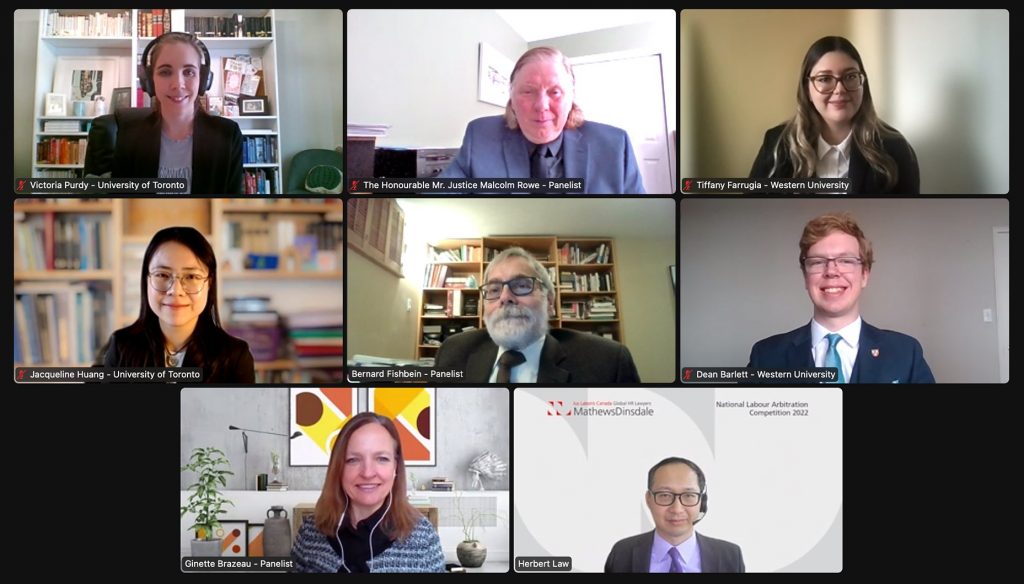
Team Members: Victoria Purdy (2L), Jacqueline Huang (2L)
Student Coaches: Olivier Bishop-Mercier (3L), Braxton Murphy (3L)
Practitioner Coaches: Kathryn Bird (formerly at Hicks Morley Hamilton Stewart Storie LLP), Amanda Lawrence-Patel (Hicks Morley Hamilton Stewart Storie LLP), Lauren Pearce (Jones Pearce LLP), Stephen Shore (Ogletree, Deakins, Nash, Smoak & Stewart, P.C.).
The moot problem this year involved a fictitious furniture company which, in response to pandemic-related challenges, was attempting to contract out its delivery work to a third-party, app-based delivery service.
In the final round, the team argued for the employer in front of an esteemed panel of The Honourable Justice Malcolm Rowe of the Supreme Court of Canada, Bernard Fishbein (Chair of the Ontario Labour Relations Board), and Ginette Brazeau (Chair of the Canada Industrial Relations Board). U of T came out victorious, taking home the win.
The team wishes to thank Harry Freedman (Sherrard Kuzz LLP), Professor Brian Langille, Professor Kerry Rittich, Arbitrator John Stout, and Arbitrator Laura Trachuk for their support.
Oxford International Intellectual Property Moot
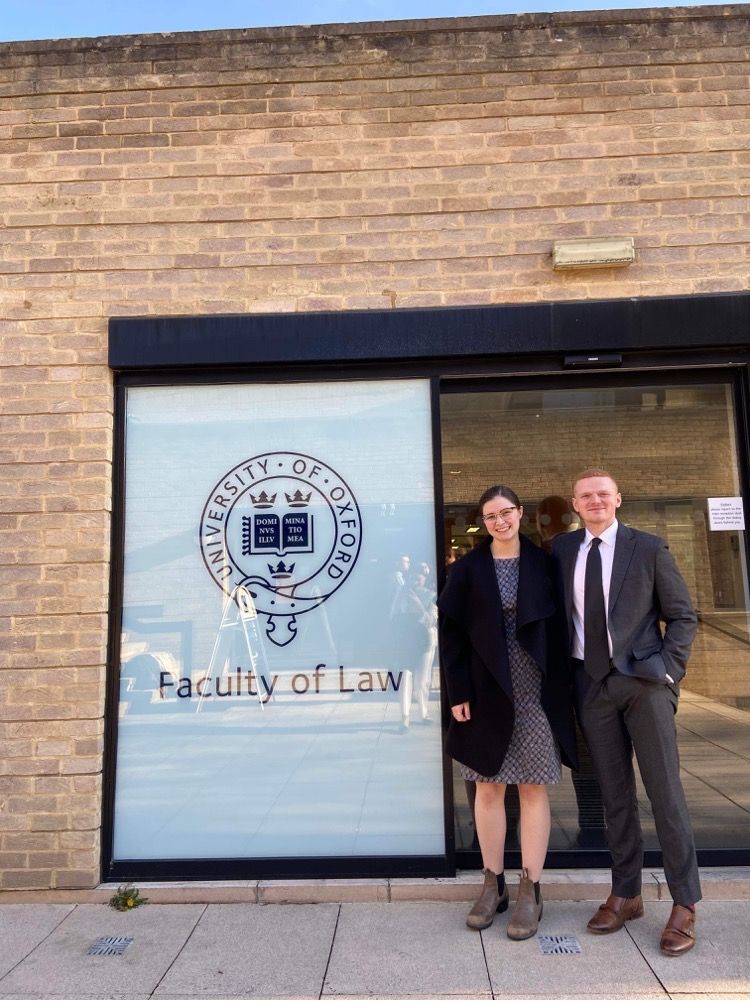
Team members: Hannah Cinel (3L), Flint Patterson (3L)
The University of Toronto sends a team to the Oxford International Intellectual Property Moot when a U of T student has been personally invited by virtue of having been named the Best-Non-Graduating Oralist at the Harold G. Fox Intellectual Property Moot in the previous year.
The moot problem was about the intellectual property protection of food. The issues included 1) the protection of a certain cake under copyright law, 2) the passing off of cake icing, and 3) usage of a protected geographical indicator.
The moot took place in-person this year at the University of Oxford Faculty of Law. The team delivered an excellent performance at the competition, reaching the semi-finals and winning the 8 New Square Best Written Submissions Prize. Hannah Cinel (3L) and Flint Patterson (3L) also took home the 1st and 5th Best Individual Mooter awards respectively.
Philip C. Jessup International Law Moot Court Competition
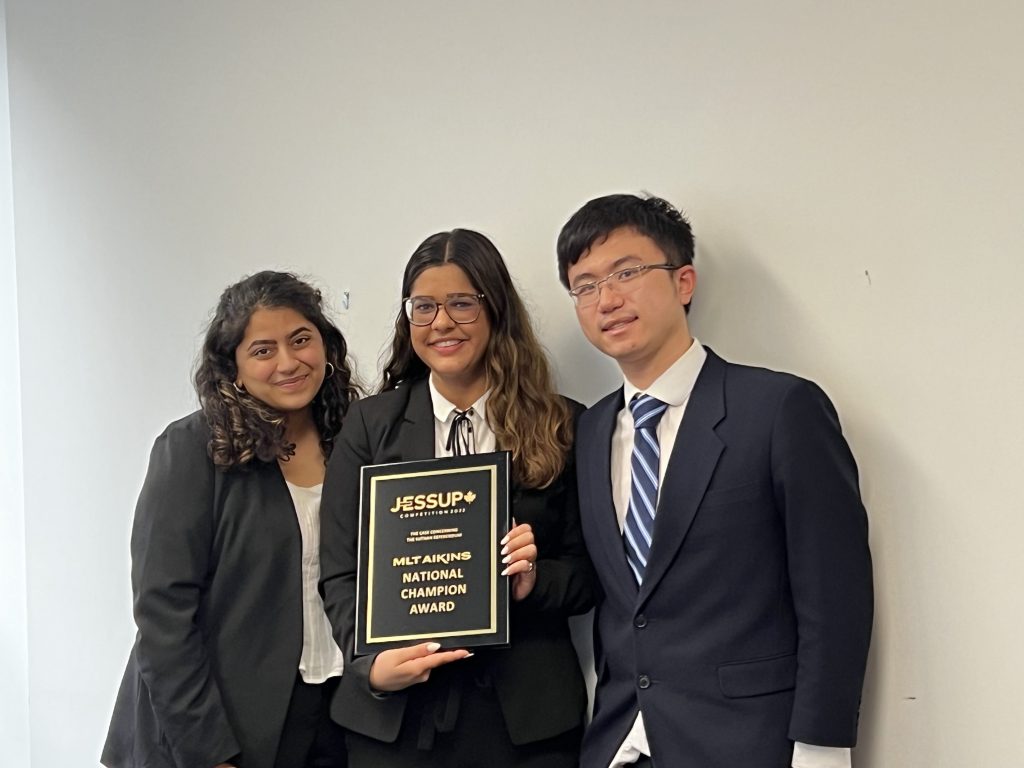
Team Members: Mishail Adeel (2L), Jonathan Hou (3L), Seema Sidhu (3L)
Student Coaches: Abrahim Ahmed (3L), Molly Campbell (3L), Natasha Williams (3L)
Practitioner Coach: Maureen Whelton (Stevenson Whelton LLP)
The moot problem was concerned with several disputes between the fictional states of Antara and Ravaria being argued before the International Court of Justice. An independence referendum was taking place in Antara’s Sutha Province, and Ravaria had a strong interest in Sutha’s independence. The issues included 1) the seizure of evidence by Antara that revealed the extent of Ravaria’s interference in the referendum, 2) a misinformation campaign orchestrated by a pro-independence organization supported by Ravaria, 3) Antara’s order for a prominent pro-independence professor’s social media account to be suspended, and 4) Antara’s intrusion into Ravarian computers and devices in a cyber operation to take down a botnet connected to the misinformation campaign.
The team argued on behalf of Antara in the finals of the national rounds, in front of a panel of The Honourable Justice Mahmud Jamal of the Supreme Court of Canada, LCdr Kat Aubrey-Horvath (Canadian Armed Forces), and Professor Mulry Mondélice (Royal Military College Saint-Jean). U of T took home the Canadian championship. The team is one of four Canadian teams that moved onto the global White & Case International Rounds, taking place from March 24 to April 10.
Team Members: Jamie Ahn (3L), Joseph Mercado (3L), Thomas Ritthaler (2L), Sarah Shin (3L).
Coaches: Florian Nagy (3L), Hannah Lank (3L).
Practitioner Coaches: Richard Glennie (McCarthy Hansen & Company LLP), Martha McCarthy (McCarthy Hansen & Company LLP), Deborah Perkins-Leitman (Beaton Burke Young LLP), Sarah Young (Beaton Burke Young LLP)
The moot problem was based on two issues: 1) Notwithstanding an order to raise the children within the Jewish faith, could a parent enroll their children in a Catholic school to avoid bullying at the children’s current Jewish school? 2) Did a separating spouse have a duty to disclose a more lucrative job offer after a settlement regarding spousal support had already been offered by the other spouse?
Jamie Ahn (3L) won the Phil Epstein Award for Top Oralist.
The team thanks Julie Hannaford (J K Hannaford Barristers, U of T Law Professor), Heather Hanson (McCarthy Hansen & Company LLP), and Charles Beall (Bales Beall LLP) for their support.
Warren K. Winkler Class Actions Moot
Team members: Griffin Murphy (2L), Elgar Gong (3L), Sean Grouhi (3L), Karan Sharma (3L)
Student Coaches: Henry Dennis (3L), Taskeen Nawab (3L)
Practitioner Coaches: Cheryl Woodin (Bennett Jones LLP), Joseph Blinick (Bennett Jones LLP)
The moot problem was a motion to certify a class proceeding against the Government of Ontario for imposing restrictions on entry to the province due to the outbreak of the fictional Blue Lily Disease. The people affected by the measures included business owners, wedding guests, people who missed the Golden Seagull mating season in Ontario, anti-government protestors, and a couple who wished to enter Ontario to take care of their daughter.
U of T had an excellent performance at the moot, with Griffin Murphy (2L) and Sean Grouhi (3L) receiving the Best Plaintiff Factum award and making it to the finals of the competition. Karan Sharma (3L) also received the 2nd top oralist award.
Willms & Shier Environmental Law Moot
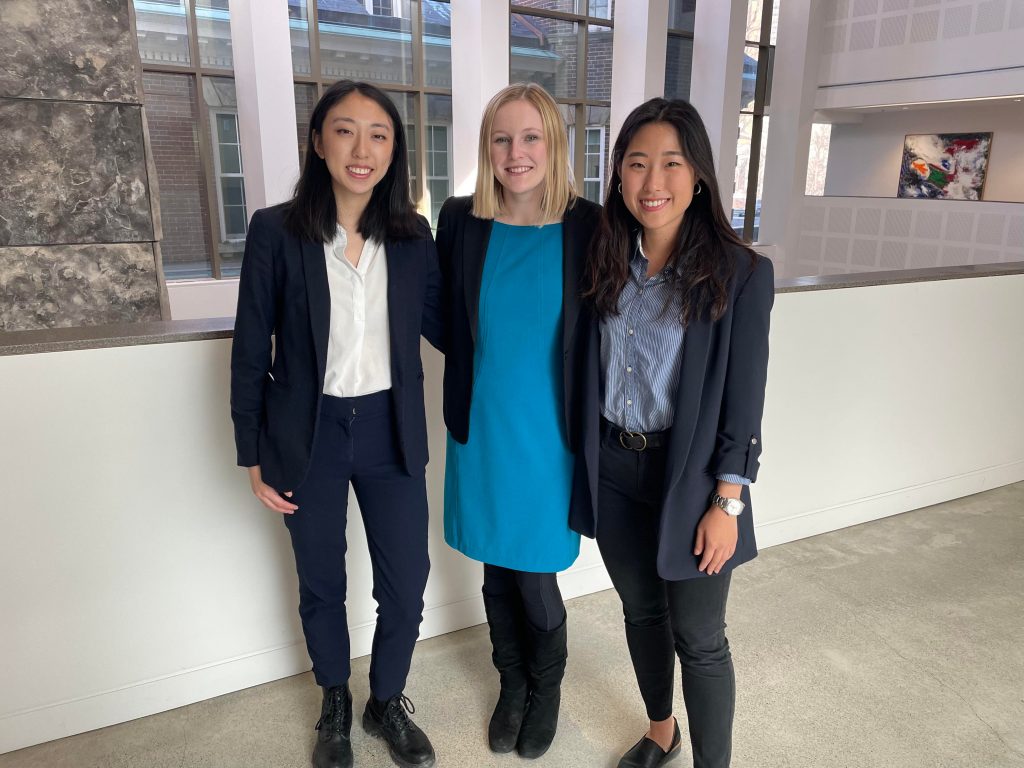
Team Members: Lauren Yan Lin Cao (2L), Jane Fallis Cooper (2L), Gina Kwon (2L)
Student Coaches: Rachel Allen (3L), Audrey-Anne Delage (3L), Hannah Lank (3L)
Practitioner Coaches: Graham Reeder (Gowling WLG (Canada) LLP), Solomon McKenzie (McCarthy Tétrault LLP)
The moot problem was an appeal to the Supreme Environmental Moot Court of Canada of the Supreme Court of Canada’s decision in the References re Greenhouse Gas Pollution Pricing Act (the “Act”). The Act, passed by Parliament in 2018, imposed a charge on greenhouse gas-producing fuels and combustible waste and put into place an output-based performance system for large industrial facilities, which requires them to pay compensation for greenhouse gas emissions that exceeded their allocated emission limits. The Attorney Generals of Ontario, Saskatchewan, and Alberta challenged the validity of the Act. The three cases eventually made it to the Supreme Court, which found the Act to be constitutional.
The Wilson Competitive Program
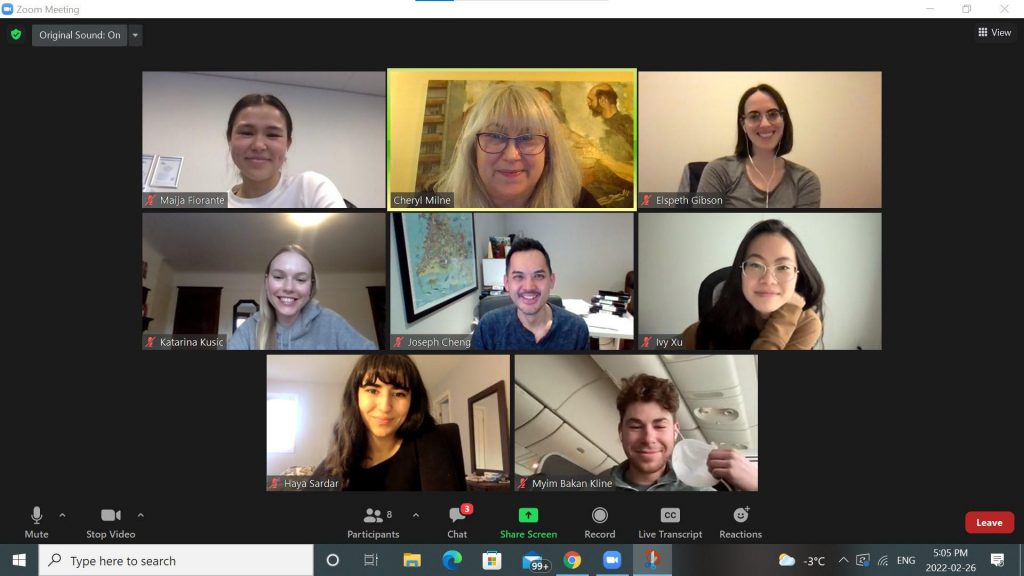
Team members: Ivy Xu (2L), Haya Sardar (2L), Elspeth Gibson (3L), Katarina Kusic (2L)
Student Coaches: Maija Fiorante (3L), Greta Hoaken (3L), Myim Bakan Kline (3L).
Practitioner Coaches: Cheryl Milne (Asper Centre for Constitutional Rights), Joseph Cheng (National Litigation Sector, Department of Justice Canada)
The moot problem was an application made by Annette Norris, a person experiencing homelessness, that challenged a by-law passed by the City of Calgary. The by-law banned all permanent and temporary overnight shelter in city parks. It also authorized immediate evictions of encampment residents, so that the residents could instead be transferred to temporary shelter space provided by the city. Ms. Norris claimed that the by-law infringed her rights under sections 7 and 15 of the Canadian Charter of Rights and Freedoms.
U of T won the prize for the 2nd best facta in the competition.
The Arnup Cup, Sopinka Cup, and the Kawaskimhon Moot are managed by the Faculty of Law instead of the Moot Court Committee.
The Arnup Cup and Sopinka Cup
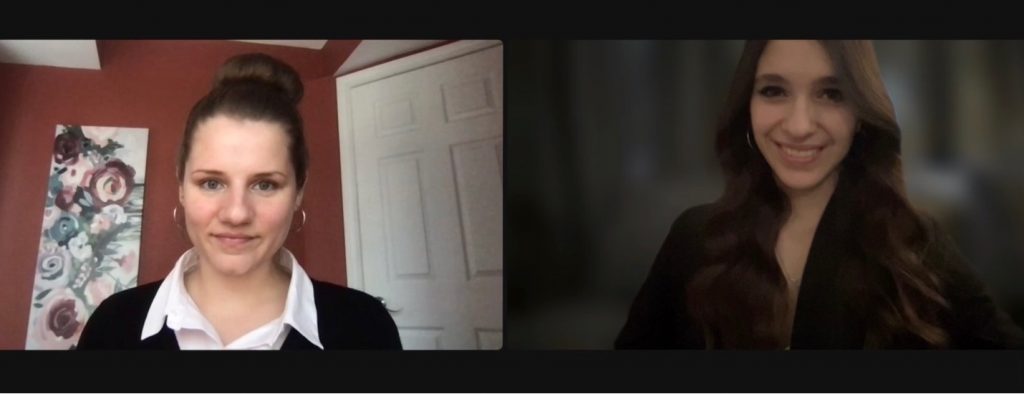
Team Members: Shannon Blaine (3L), Alannah Safnuk (3L)
Practitioner Coaches: Corie Langdon (Toronto Region Crown Attorney’s Office), Emily Marrocco (Guns and Gangs Unit, Toronto), Darilynn Allison (Peel Crown Attorney’s Office).
Special thanks to Julie Hannaford (J K Hannaford Barristers, U of T Law Professor).
The Arnup Cup is an annual trial advocacy competition for Ontario law schools. The first and second place teams in the Arnup Cup will then participate in the Sopinka Cup National Trial Advocacy Competition.
The problem involved a murder that took place in the fictional small town of Pointe Claire in the province of Sopinka. The accused, Angela Scarconi, was charged with first degree murder while using a prohibited firearm. The case involved a criminal organization, a series of hitmen, and a World Cup soccer game. Joseph Coriano, a known hitman, was found wrapped in a carpet in the basement of Ms. Scarconi’s burned-out spa, poisoned with windshield washer fluid, shot twice in the head, and incinerated almost beyond recognition. Matters were complicated by a potential alternate suspect and forensic evidence open to multiple interpretations.
The U of T team acted as the Crown in the Arnup Cup and secured first place in the competition. Blaine and Safnuk went on to represent Ontario in the Sopinka Cup, where the team had the opportunity to switch roles and defend Ms. Scarconi.
Team Members: Jenna D’Aurizio (3L), Maggie Morris (3L)
Practitioner Coaches: Bryce Edwards (Olthuis Kleer Townshend LLP), David Walders (Grand Challenges Canada)
The Kawaskimhon Moot is a consensus-based, non-adversarial moot that incorporates Indigenous legal traditions along with federal, provincial and international law. This year, teams represented the Grand Council of the Crees (Eeyou Istchee), an Atikamekw First Nation community, the Assembly of First Nations Quebec-Labrador (AFNQL), the Government of Canada, the Government of Quebec, and Hydro-Quebec in a multi-stakeholder negotiation. The goal was to reach an agreement in principle for the future development of a transmission line through Quebec territory covered by the James Bay and Northern Quebec Agreement. Following two days of negotiations, the U of T team, which represented the AFNQL was pleased to reach an agreement between all parties which engaged Eeyou and Atikamekw legal principles alongside Canadian and Quebec laws.
Editor’s Note: Thank you to all the students who have provided information and photos, especially Ema Ibrakovic (3L) from the Moot Court Committee.





